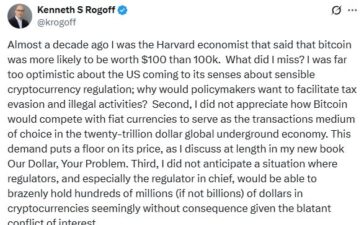India started the new year by unveiling its Union Budget for 2025-26 financial year on 1 February 2025.
While certain areas of the budget have excited the Indian masses, crypto industry leaders feel disappointed by the government’s decision to retain the existing taxation framework for cryptocurrencies
However, there is grassroot stirring in favour of a more cohesive and investor friendly crypto framework in the country after the announcement of President Trump’s crypto friendly policies that seem to be sinking into the global financial psyche.
Prior to the budget announcement, the crypto industry tied their hopes on reforms that would alleviate hefty taxes imposed in the previous years. A flat 30% tax on income from the transfer of virtual digital assets (VDAs), along with a 1% Tax Deducted at Source (TDS) on transactions exceeding specified thresholds was introduced under The Finance Act of 2022.
The government threw another curve ball by preventing losses from VDAs from offsetting against other income sources or gains from other VDAs. Industry participants grew more optimistic about addressing concerns and relaxing some of the stringent compliance requirements imposed.
Explore: What Changes To Expect In Crypto Policy? US Crypto Regulations: A 2025 Forecast
Crypto Industry Leaders In India Expresses Disappointment
A series of comments from cryptocurrency businesses and investors voicing the widespread discontent with the budget’s failure to provide any relief or regulatory clarity has made its way to various media channels.
Sathvik Vishwanath, Co-Founder and CEO of Unocoin said, “The Union Budget 2025 offers no respite for crypto investors, as taxation policies remain unchanged, maintaining the 30% tax on gains and 1% TDS on transactions. This continues to create liquidity issues, discouraging retail participation and innovation in the sector.”
Furthermore, the introduction of new compliance measures has raised apprehensions within the industry.
During the budget announcement, Finance Minister Nirmala Sitharaman proposed amendments to the Income Tax Act. She proposed mandating a designated reporting entity to disclose any transaction details pertaining to VDAs.
Unreported crypto gains are going to be classified as undisclosed income, attracting a tax rate of 60% on such gains.
Additionally, authorities will charge a 50% penalty on the tax amount if they detect it during assessments.
“It is proposed to bring amendment in the Income Tax Act to provide for that a prescribed reporting entity in respect of crypto asset shall furnish information in respect of a transaction in such crypto asset, in a statement as prescribed,” the budget says. “It is also proposed to align the definition of virtual digital asset accordingly.”
Consultation Paper On India’s Crypto Regulations Sees Further Delays
Corresponding to the budget discussions, a revaluation of the country’s cryptocurrency regulations by introducing a consultation paper is ongoing. The long-anticipated paper was expected to be released in March 2025 but may see further delays.
#India is rethinking its #crypto stance! With the global perspective on digital assets warming up, India is revisiting its approach towards crypto regulation.
Currently, crypto in India is unregulated but heavily taxed, with a 1% TDS and a 30% capital gain tax. The sector has… pic.twitter.com/zCnotn3zd5
—
Market Insights (@XRPWorldShift) February 3, 2025
India’s Economic Affairs Secretary Ajay Seth said, “More than one or two jurisdictions have changed their stance toward cryptocurrency in terms of the usage, their acceptance, where do they see the importance of crypto assets. In that stride, we are having a look at the discussion paper once again.”
The country had previously decided to chart its own path to develop its own crypto framework. However, seeing the global adoption of crypto, sentiments are starting to change.
He further said, “as digital assets do not believe in borders, India’s stance cannot be unilateral.”
In December 2023, India’s Financial Intelligence Unit (FIU) had issued show-cause notice to nine crypto exchanges in non-compliance with the local laws.
In June 2024, authorities fined Binance 188.2 million Rupees ($2.25 million). This was a month after the world’s biggest crypto exchange registered with the FIU to resume operation in India.
Explore: India Is Deliberating On A Cryptocurrency Framework, Focus Remains On International Collaboration
Crypto Traction Continues To Grow Still
Despite heavy taxation, investors in India have capitalized on digital assets. Many use offshore exchanges through VPNs to circumvent restrictions. India’s market watchdog, last year suggested regulators to oversee trade in cryptocurrencies. Investors the country saw this as a sign that they might be open to using private digital assets.
The central bank of India, however, has maintained that private digital currencies represent macroeconomic risk.
CoinDCX CEO Sumit Gupta says that India must embrace crypto regulations. Sumit explains that high taxes and undecided crypto policies are hurting Indian investors. He says that delays in forming a crypto framework could cause India to lose innovation, value and talent in the crypto space to global players.
High taxes and a 1% TDS have driven 90% of Indian investors to seek opportunities offshore. This has resulted in a staggering loss of Rs 6 lakh crores in volume.
Gupta says that the new Reserve Bank of India (RBI) governor understands newer technology and is knowledgeable about the crypto space. He believes that 2025 is a key year for crypto globally as many countries are planning key regulations around digital assets.
Explore: India Curiously Optimistic About JioCoin Amidst High Taxation
The post India Reconsiders Crypto Regulations, But Budget 2025 Disappoints Crypto Industry appeared first on 99Bitcoins.






